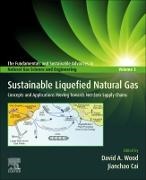Read more
List of contents
Preface1. LNG: An Evolving Industry with Net-Zero Challenges
Section One: Natural gas liquefaction2. The evolution of global LNG supply chains: A Review
3. Natural Gas Liquefaction Technologies and Their Uptake in Floating LNG Facilities
4. The core liquefaction facility in FLNG: spiral-wound heat exchanger
5. Australian LNG sector: Struggling to Achieve Commercial and Environmental Sustainability or Community Satisfaction
6. Supersonic separation technology for natural gas dehydration in LNG plants
Section Two: LNG shipping and offshore storage facilities7. LNG carriers and FSRU: opportunities to improve their operational efficiency
8. Sustainable LNG deliveries and FSRU operations: planning and scheduling simulations
9. Liquefied Natural Gas Cold Energy Utilization Technology Process Efficiency for Floating Regasification Facilities
Section Three: Onshore Storage and Regasification10. Dynamic simulation models for an LNG storage tank
11. Stratification and rollover behavior of liquefied natural gas in storage tanks
12. LNG rollover monitoring and control associated with floating storage and regasification units (FSRU)
Section Four: Small-scale LNG facilities and operations13. Safety of LNG bunkering operations and facilities
14. Exploiting cold energy associated with LNG regasification processes
Section Five: LNG markets and utilization15. LNG Marketization progress in China and its LNG price indexes
16. Carbon-neutral LNG cargoes: a potentially valuable concept requiring improved transparency
About the author
David A. Wood has more than forty years of international gas, oil, and broader energy experience since gaining his Ph.D. in geosciences from Imperial College London in the 1970s. His expertise covers multiple fields including subsurface geoscience and engineering relating to oil and gas exploration and production, energy supply chain technologies, and efficiencies. For the past two decades, David has worked as an independent international consultant, researcher, training provider, and expert witness. He has published an extensive body of work on geoscience, engineering, energy, and machine learning topics. He currently consults and conducts research on a variety of technical and commercial aspects of energy and environmental issues through his consultancy, DWA Energy Limited. He has extensive editorial experience as a founding editor of Elsevier’s Journal of Natural Gas Science & Engineering in 2008/9 then serving as Editor-in-Chief from 2013 to 2016. He is currently Co-Editor-in-Chief of Advances in Geo-Energy Research.Jianchao Cai received his B.Sc in Physics from Henan Normal University and MSc and Ph.D in Condensed Matter Physics from Huazhong University of Science and Technology. He is currently a professor at the Institute of Geophysics and Geomatics at the China University of Geosciences (Wuhan). Meanwhile, he serves as Associate Editor or Editorial member for several journals including Journal of Natural Gas Science & Engineering, International Journal of Oil, Gas and Coal Technology, Fractals. He has published more than 130 journal articles, two books, and numerous book chapters.

